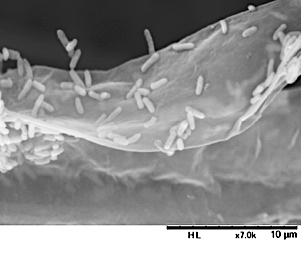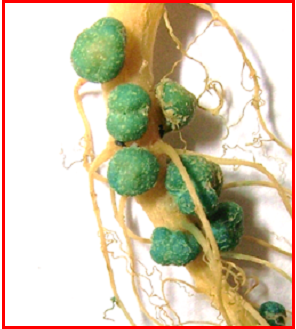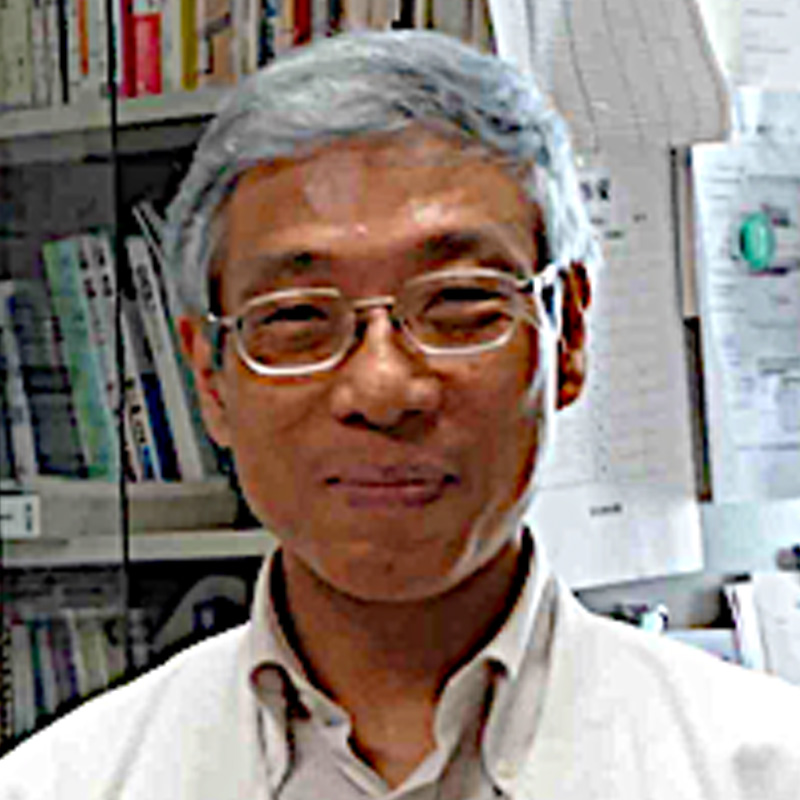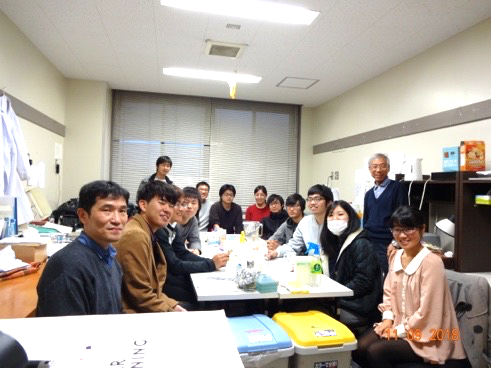OHWADA Takuji Professor
My DreamStudy on the plant health through the symbiotic relationship between microbes and the host plants
ThemeUtilization of plant symbiotic bacteria for food production
Instructable research topic for doctoral thesis
- 有用細菌による植物の環境ストレス適応、機能性強化に関する研究
- ウレタンの効率的な微生物分解技術の開発と農業生産への利用に関する研究
- 微生物資材の効果の検証(植物病害防除、感染機構の解明など)に関する研究
Message
私は卒業論文で微生物のアミノ酸転換発酵の研究に取り組んで以来、ずっと微生物一筋です。私たちの体に無数とも言える微生物が常在化しているのと同様に、植物も多様性に富んだ”常在菌”と共同生活をしていて、これら共生微生物群のコミュニティーは、植物が健康に育まれ、安全で持続的・発展的な食の生産に重要な役割を持っています。近年、共生微生物集団は「アグリバイオーム」とも呼ばれ、植物の生育促進や病害防除に大変有用であることがわかってきました。共生微生物で植物を健康に育み、安全安心な食の生産やその付加価値と機能性の向上に関わる研究にチャレンジし、その成果を十勝から世界へ向けて発信してみませんか?
| Academic degree | Ph.D, Agriculture |
| Self introduction |
I was born in Kyoto, but I've lived longer in Hokkaido longer—ever since I moved here to enter university. For my graduation thesis, I conducted research on conversion fermentation, which is the process whereby a target amino acid is fermented or produced through the combination of different microbes. |
| Room address | General Research Building 3 |
| Room number | 407 |
| Mail address | taku  obihiro.ac.jp
obihiro.ac.jp |
Belongs
Research Department/Department of Life and Food Sciences/Division of Food Science/Section of Biomolecular Structure and FunctionIntroduction
Microbes that inhabit plant tissues symbiotically are called endophytes. The effects of endophytes isolated or selected from crops that are representative of Tokachi (e.g., potatoes and beets) on the promotion of plant growth, the improvement of environmental adaptability, and the mechanism of infection and symbiosis in plants are studied in order to use endophytes to improve agricultural productivity. In recent research, we've found that the localization of plant tissues varies by strains (systems), and that mixed inoculation with strains without antagonizing localization (strains that can coexist or be segregated) improves the inoculation effect in a synergistic manner. We've also found excellent plant growth promotion and biocontrol factors in useful endophytes isolated or selected from beets (Fig. 3). Bacteroids have the ability to reduce (fix) nitrogen in the atmosphere to ammonia by forming bumps (root nodules) in the roots of legume plants, and they're very important to farming as soil bacteria that provide microbial nitrogen fertilization (Fig. 4). Through exhaustive analyses of root nodule gene expression in the symbiotic process, we've discovered extensive gene regions related to symbiosis, analyzed their expression, and found that the expression of one such region (the Type 3 secretion system) is controlled by temperature and genes (nodD2). We've also found that the symbiotic system of soybeans and their root nodules is optimized when the concentration of a signal substance of soybean origin (genistein) that is found in root nodules and that is cytotoxic, is adjusted by the control of chemical discharge pumps, and we presented a new paradigm that isn't found in the conventional mechanism of symbiosis. We've also succeeded in developing and commercializing a new material (NPORUS) with excellent practical properties that is made from urethane, and we've been engaged in research on its application to efficient agricultural production.


List of current research topics
- Study on adaptation of plants to environmental stress and enhancement of their functional compounds by plant symbiotic bacteria.
- Development of efficient microbial decomposition technology for urethane and its application to agricultural production
- Study on effects of microbial materials (biological control of plant diseases, etc.)
| Related industries | agricultural production, biorecycle |
| Affiliated academic society | The Japanese Society of Plant Microbe Interactions, The Japan Society for Bioscience, Biotechnology, and Agrochemistry, The Japanese Society of Soil Science and Plant Nutrition, The Japanese Society of Soil Microbiology, The Society for Biotechnology, Japan |
| Academic background | 1983: School of Agriculture, Hokkaido University (Graduated) 1985: Graduate School of Agriculture, Hokkaido University (Completed Master's Degree) 1988: Graduate School of Agriculture, Hokkaido University (Completed Doctoral Degree) 1989-1991: Research Fellowship for Young Scientists, JSPS, Institute of Low Temperature Science, Hokkaido University 1990-1991: University of Colorado 1991-1998: Research Fellow, School of Agriculture and Animal Science, Obihiro University of Agriculture and Veterinary Medicine 1995: Monbusyo Fellowship Program for Japanese Scholars and Researchers to Study Abroad, University of Tennessee 1998-1999: Assistant Professor, School of Agriculture and Animal Science, Obihiro University of Agriculture and Veterinary Medicine 1999-2014: Associate Professor, School of Agriculture and Animal Science, Obihiro University of Agriculture and Veterinary Medicine 2014-: Professor, School of Agriculture and Animal Science, Obihiro University of Agriculture and Veterinary Medicine |






